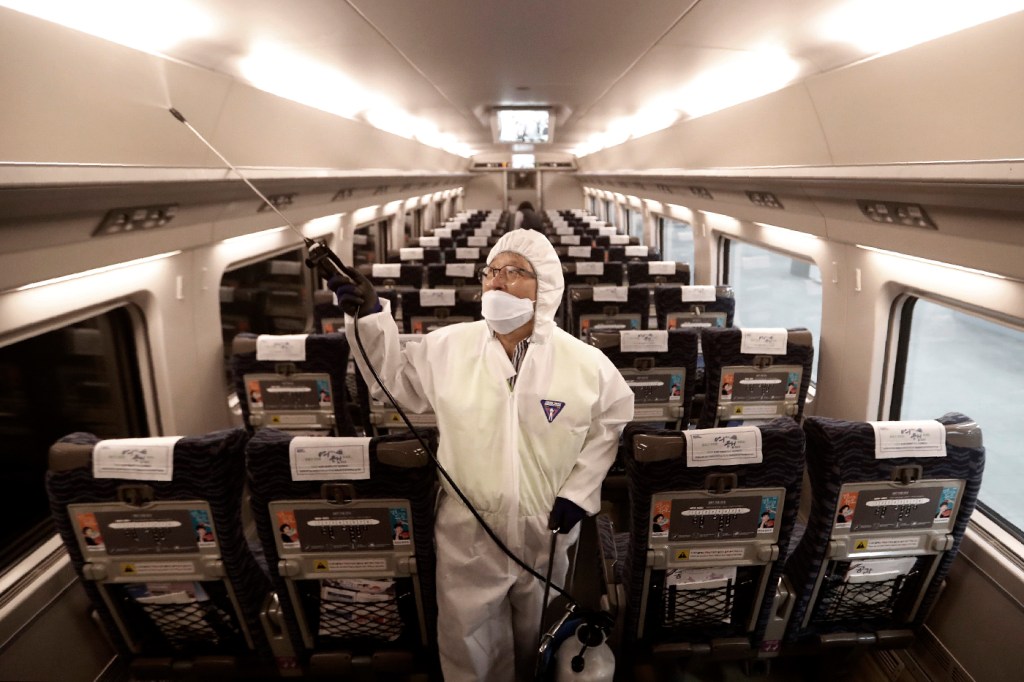Does China’s response to the coronavirus outbreak reflect lessons learned from SARS?

Fear of a global pandemic is one of the factors driving China’s surprising decision to shut down airports in the hope of containing a dangerous virus.
The Chinese government also appears to be influenced by the failure of its response in 2002-03 to the outbreak of severe acute respiratory syndrome, says Jonathan Kaufman, director of the School of Journalism at Northeastern and former China bureau chief for The Wall Street Journal. The SARS epidemic resulted in the deaths of almost 800 people among the estimated 8,000 who were infected.

Jonathan Kaufman, director of the School of Journalism at Northeastern, reported on China for 30 years for The Wall Street Journal, Bloomberg News, and The Boston Globe. Photo by Matthew Modoono/Northeastern
One dozen cities near the center of the current outbreak were included in the Chinese travel lockdown that was announced on Friday. The mysterious coronavirus, which is believed to have begun at a seafood market in Wuhan, a sprawling provincial capital in central China, has killed at least 100 of the more than 4,500 people who are known to be infected. The disease has spread to 15 countries, mostly in Asia, but also Europe, Australia, Canada, and the U.S., where five cases have been reported thus far. The travel limits are affecting more than 50 million people.
“Are they just being cautious, or are things more serious than we know?” says Kaufman, a Pulitzer Prize-winning journalist who reported on China for 30 years for The Wall Street Journal, Bloomberg News, and The Boston Globe. “That’s part of the part of the mystery here: Do the Chinese know something that we don’t about this virus, based on the dramatic sanctions? What exactly is motivating them?”
Kaufman was recently in China to update his book, The Last Kings of Shanghai: The Rival Jewish Dynasties That Helped Create Modern China, which will be published by Viking in June.
What did you see, in terms of the response to the outbreak, when you were in China in early January?
I was in Shanghai and Hong Kong, and you could already see nervousness. You saw some people with masks, and you could see they had begun to set up [medical] stations at the airports and train stations. So they hadn’t gone into full attack mode yet, but they were clearly getting ready, because I think they wanted to move fast if this became more serious.
You were a correspondent for The Wall Street Journal when SARS broke out. How did China’s experience with SARS influence the ongoing response to the Wuhan coronavirus?
We did a lot of reporting on it, which was quite difficult because the Chinese were covering it up. My family had to come back to Boston because the international schools were closing, and it became a full-blown crisis that grew worse because China moved very slowly to let the world know what was happening.
My sense is the Chinese are trying to move very fast to understand and contain this because they realize how damaging it can be in an international environment, especially after the criticism they took for covering up SARS. If you don’t move fast enough, the consequences can be devastating, not just in the health sense, but for your economy and your reputation.
What were the consequences of China’s slow response to SARS?
A lot of foreign businesses sent their executives home. There was a fear among the Chinese that this could really slow foreign investment in China. And then Hong Kong and many of the countries in Southeast Asia felt betrayed because China wasn’t telling them what was going on. Separate from the health concerns and the people who died, which was really unfortunate, what really rattled China was that SARS could destabilize both its image in the world and its effort to become a responsible global power.
Is China’s current response signaling not only a desire to be a better global neighbor, but also to show responsibility in its larger goal to overtake the U.S. as a world leader?
They do want to be part of a global system, and my sense is that this very rapid and almost extreme response is an effort to say to the world that ‘We are going to try to get a handle on this.’
China has been very active in the United Nations and its peacekeeping missions, and in terms of foreign investment in Africa. I think they do see an opportunity that as the U.S. retreats from the world stage, this is an opportunity for China to show that it is a responsible actor.
Is it in some ways easier for an authoritarian state like China to respond to a crisis like this than it would be for a representative democracy like the U.S.?
The one thing China is able to do is to impose restrictions and rules. I’ve talked to people in China who said that once the announcement came out that people should wear masks, everybody was wearing masks. Conversations I’ve had with people in China indicate that the buses are empty. People are staying home. China is a society where the government has the ability to shut down the country, which is what they’re doing in many parts now.
What is different is that with social media, and with a more sophisticated population of people who have traveled and had some freedom to go to other countries and meet other kinds of people, there is a lot of anger. People are upset that maybe they can’t get masks, or that the government isn’t telling them exactly what is going on. So I think there are risks for China. If you look on social media, you’re already seeing some Chinese saying, ‘Why are our leaders not here visiting us? Why aren’t we getting more information?’ When the U.S. has a health crisis, we want to hear from our leaders. In China, there’s more a sense of, ‘We’ll tell you what to do, and we’ll explain it to you later.’
Do you see signs from this crisis that China may someday express leadership on other global issues, including climate change?
Climate is much more complicated—it involves political and economic issues for China. But I do think that the more they are trying to cooperate with the world in addressing problems like this, the better it is. Because China is a powerful country. It’s an influential country. And you want a system in which countries respect each other and cooperate when there is a crisis. At this point, I feel that this is a good sign that China is moving so aggressively, and certainly being more transparent and aggressive than during SARS.
What are the hardships for the Chinese people? How are they responding?
This is Chinese New Year, and hundreds of millions of people are traveling to their home villages, they’re traveling to see relatives. I believe that more people are riding the train in China during this two-week period than the [rest of the] year.
Imagine the U.S. shutting down public transportation on the week of Thanksgiving or Christmas. That’s what is going on in China now.
So this is both a logistical issue and an emotional issue. This is the one chance for many Chinese to have a vacation, their one chance to travel and see their family. And suddenly they’re being told they can’t travel, or it may be dangerous to travel; or they show up at a relative’s city and suddenly they can’t leave. Many Chinese are very angry with what is going on, and they’re asking a lot of questions.
For media inquiries, please contact media@northeastern.edu.
